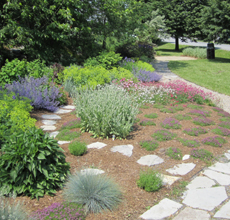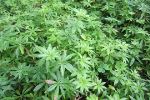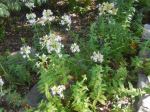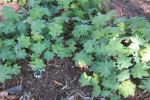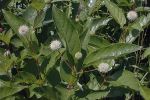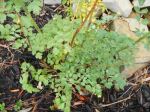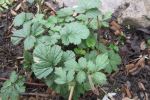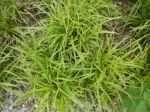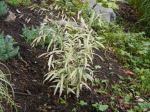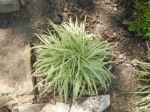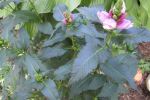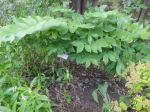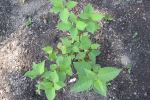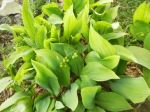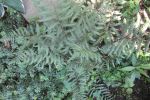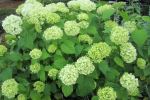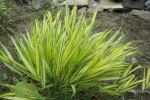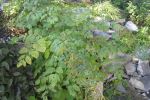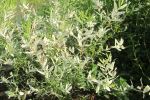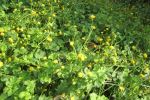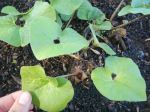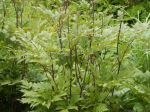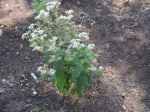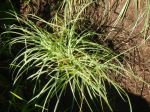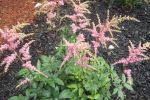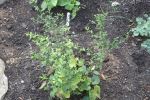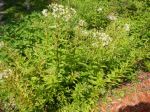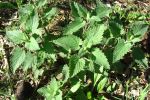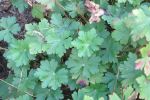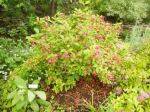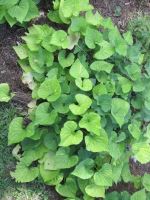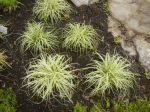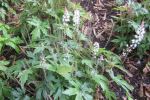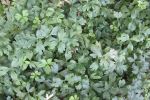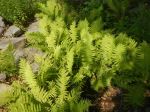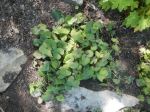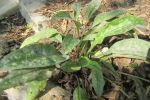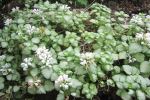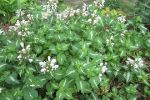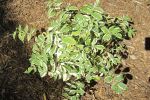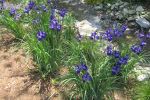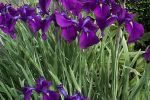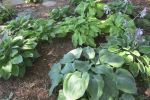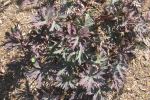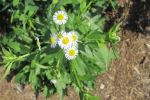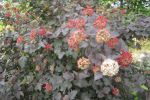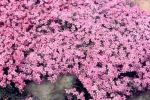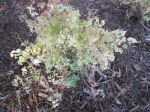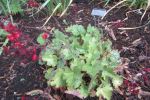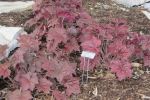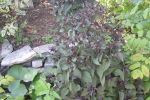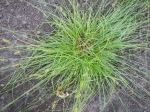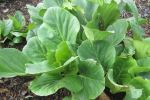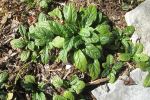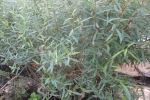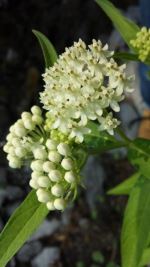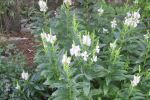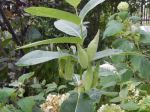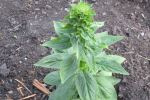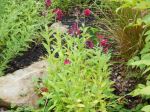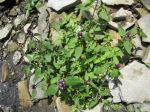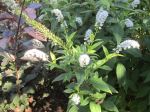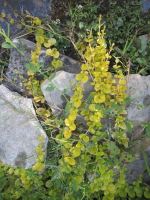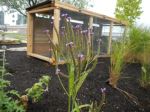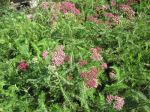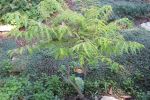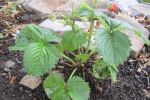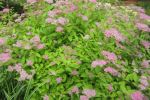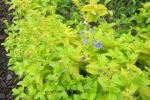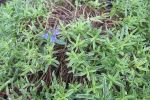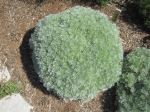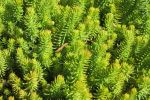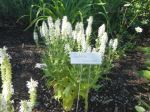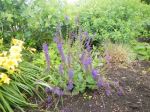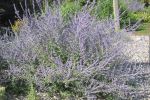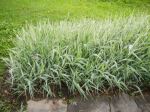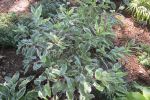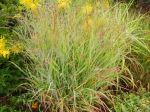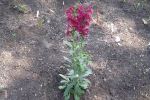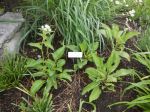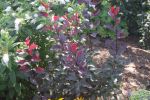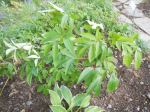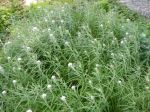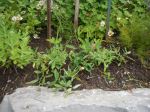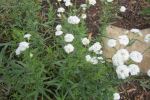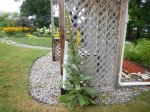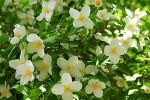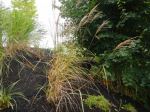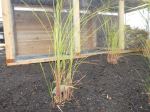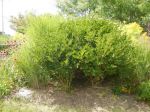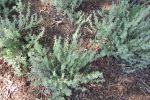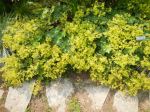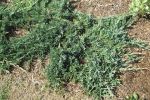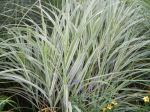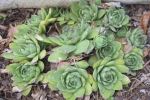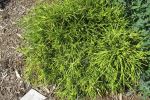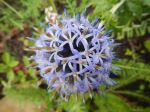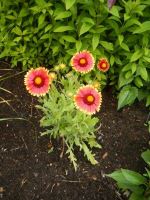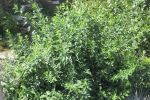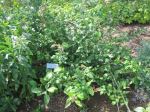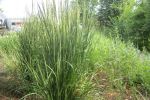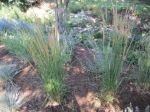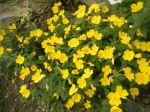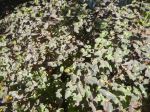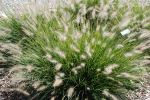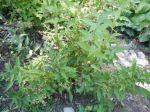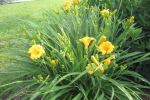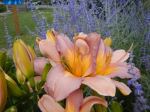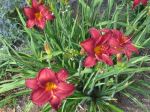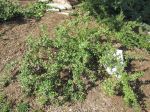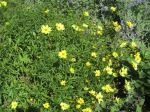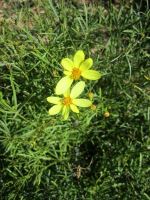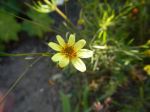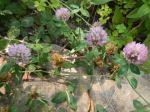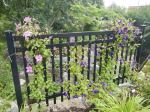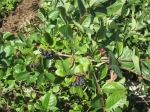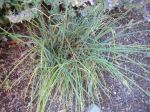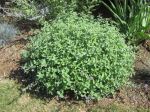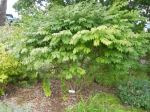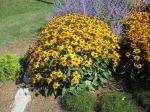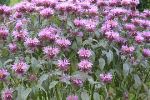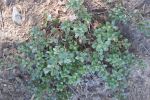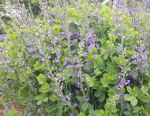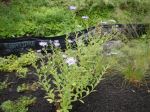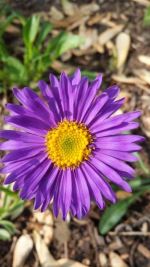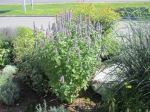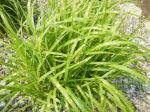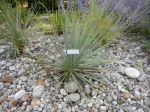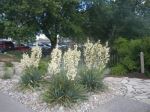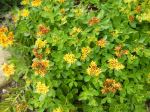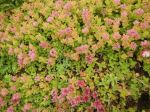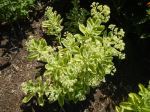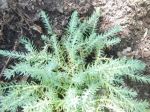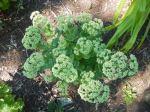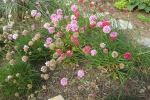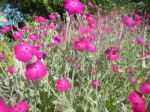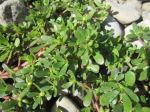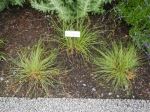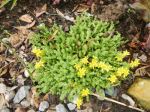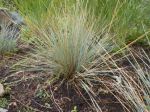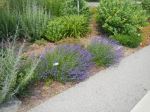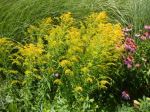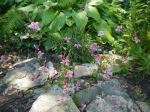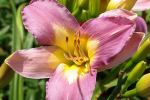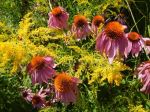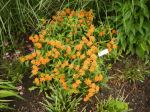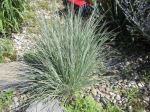
Water Conservation Garden
Come visit Utilities Kingston Conservation Garden at 1211 John Counter Boulevard and discover the secrets of growing a garden that only needs to be watered in the driest of times! Also, learn what else you can do to protect the water resources we all depend on.
The garden has many informative signs that provide tips about water conservation methods, with only a few signs mentioning specific details about plant species. As shown on the map below, the Water Conservation Garden has over 30 garden areas.
Need some inspiration to get started in your own garden? Try incorporating the drought-tolerant, low-maintenance plants outlined in our water-wise garden guide.
Garden areas
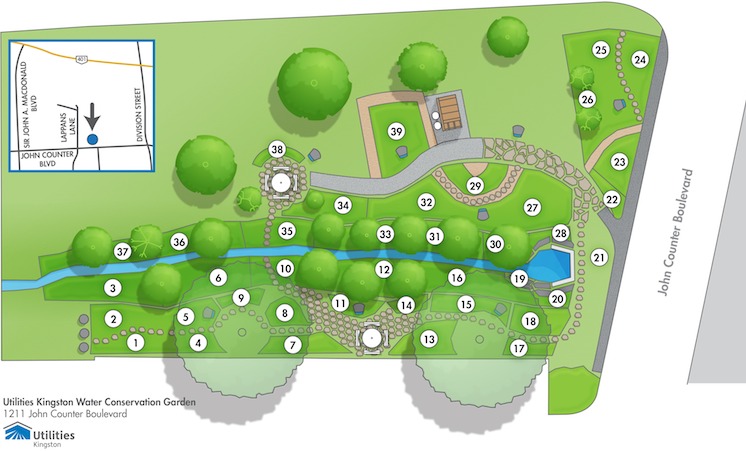
Each plant in the list below includes the garden area in which it lives. See if you can find your favourite plant when you visit!
If you do visit, you may want to print this page and bring it with you for your walk through the garden.
Things you should know about smart gardening and landscaping
The following Utilities Kingston web pages contain helpful background information and practical tips for managing your garden in a water-friendly way.
Visit our Conservation Tips page for other ways to save water, energy, & money.
Did you know? Dense and healthy vegetation helps reduce carbon emissions.
By creating small carbon sinks in your backyard, you can absorb and store greenhouse gases, which would otherwise be present within our atmosphere. Plants also create a cooling effect through shade and evapotranspiration (by which plants uptake water from the soil to use for growth and photosynthesis).
Treated water use outdoors
Reducing the amount of treated water used outdoors during the summer is an important part of water-wise gardening. Learn more by visiting Summer Use Water Restrictions.
Looking to save even more treated water? Try a rain barrel! Find out how to order one!
Please note that the following list of plants is intended for your own backyard garden. Not every plant listed here can currently be found in the Utilities Kingston Conservation Garden.
Water wise plant guide
| Term | Description |
|---|---|
| Sun | Full sun; plants in this category do still benefit from shading of the soil and roots to lower temperature and slow evaporation |
| Partial sun | 3/5 to 4/5 of sunlight hours in direct sun |
| Bright shade | 2/5 of sunlight hours in direct sun |
| Shade-loving | Deep shade to very little sun |
| Dry soil | Soil that is usually dry, meaning at higher elevation or high sand content or both |
| Well-drained moist soil | Soil that holds moisture but also allows oxygen to penetrate the roots is ideal for most plants. It is achieved through a combination of high organic content and earthworms. |
| Plant | Image | Preferences | Characteristics | Care |
|---|---|---|---|---|
|
Trillium |
Image currently not available.
Garden area: 6 |
Sun preference: Shade Soil preference: Well-drained, moist soil Drought tolerant: Moderately |
Ontario's provincial flower. Three leaves, with three large white petals and yellow centres. Flowers in early spring. Can grow up to 18"/46 cm tall. |
Apply compost annually. Keep well-watered until established. |
|
Sweet Woodruff |
Garden area: 10, 13 |
Sun preference: Shade Soil preference: Drought tolerant: No |
Bright green star-like leaves with delicate white flowers in spring. Excellent ground cover for shady areas, but can be invasive. 10-20 cm/4-8" tall. |
Trim off 2" after bloom to promote bushiness. Keep back from other plants. Easily divided. |
|
Perennial Phlox |
Garden area: 10, 11, 12 |
Sun preference: Shade Soil preference: Drought tolerant: No |
60 cm/24" high stalks with white-light pink blooms in August. Can be invasive, but good for erosion control. |
Dead head to promote second bloom. Manage spread. |
|
Geranium Macrorrhizum/ Bigroot Cranesbill |
Garden area: 4, 7, 27, 28, 30, 32, 35 |
Sun preference: Shade Soil preference: Drought tolerant: Yes |
Deep green, serrated foliage with delicate pink flowers in late spring. Popular as a ground cover, it spreads nicely in a mounding habit. Attracts beneficial insects. Grows about 25-30 cm/10-12" high. |
Needs only occasional watering during dry summers. Can be split and replanted easily. |
|
Buttonbush |
Garden area: 39 |
Sun preference: Partial sun Soil preference: Drought tolerant: No |
Wetland shrub featuring unusual white globular flowers. Leaves are dark green, and sometime shiny. Blooms mid-summer to fall. Can grow up to 3m/9' tall. |
Carefree |
|
Bittercress |
Image currently not available.
Garden area: Creekside |
Sun preference: Partial sun Soil preference: Wet roots Drought tolerant: No |
A self-seeding annual or biannual wildflower with many small, rounded leaves that form a low bushy look. Flowers are small and white. Grows to a maximum of 30 cm/12" tall. |
Carefree, but hard to eradicate once present in garden/lawn. |
|
Yellow Meadow Rue |
Garden area: 39 |
Sun preference: Partial sun Soil preference: Drought tolerant: No |
Lacy, blue-grey foliage with tall stalks featuring large, cloud-like sprays of tiny lemon yellow flowers. Blooms early to mid-summer. 40–100 cm/16–40" tall. |
Carefree |
|
Water Avens |
Garden area: 10, 16 |
Sun preference: Partial sun Soil preference: Drought tolerant: Yes |
Reddish-brown flowers from early sping until fall on tall stems. Flowers often described as 'nodding'. Seed pods are burr-like. 25–50 cm/10–20" tall. |
Grows best beside water. Remove seed pods to prevent spreading, if desired. |
|
Variegated Sedge |
Garden area: 6, 13, 34, 39 |
Sun preference: Partial sun Soil preference: Drought tolerant: Yes |
Thin, delicate leaves reminiscent of a palm tree. Green and white striped. Forms clumps and is non-invasive. 6-12" high. |
Remove or cut back dead leaves in spring to make way form new growth. |
|
Variegated Sea Oats |
Garden area: 6 |
Sun preference: Soil preference: Drought tolerant: Yes |
Clumps of stems with green and white striped bamboo-like leaves. Flower heads looks like oats and are straw-coloured. Blooms late summer to early-fall. Grows 75-90 cm/29-35" tall. |
Very easy to care for, will tolerate most sun and soil conditions. |
|
Variegated Japanese Sedge 'Silver sceptre' |
Garden area: 6 |
Sun preference: Soil preference: Drought tolerant: No |
Cream and green variegated blades are delicate and form a shapely mound. Grows 30-46 cm/12-18" tall with a similar spread. |
This sedge will also do well in full sun. Can be propagated by division. |
|
Turtlehead 'Hot Lips' |
Garden area: 16, 31, 39 |
Sun preference: Partial sun Soil preference: Drought tolerant: No |
Individual shoots with spires of pink flowers that resemble turtles' heads with their mouths open. Starts blooming in late summer. Grows 90-100 cm/36-40" tall. |
Carefree |
|
Solomon's Seal |
Garden area: 30-35 |
Sun preference: Soil preference: Drought tolerant: No |
Tall arching stems with dangling leaves and small white, bell-shaped flowers in late spring. Flowers become interesting looking black berries later in the season. 90-120 cm/35-47" in height. |
Can be slow to establish, but low-maintenance and long lived once established. Can be divided in the fall. |
|
Silky Dogwood |
Garden area: 39 |
Sun preference: Partial sun Soil preference: Drought tolerant: No |
Deciduous shrub with red stems with green bottom that ages to white. Berries turn from white to blue in fall. Birds enjoy the berries. Can grow up to 3 m/9' tall. |
Prune as desired. |
|
Lily of the Valley |
Garden area: 12, 16 |
Sun preference: Soil preference: Drought tolerant: Yes |
Broad lance-shaped leaves with small, white, bell-like flowers in early spring. Very fragrant. Poisonous if ingested. Grows to about 20 cm/8" tall. |
Known to take over garden areas, so watch for spread or keep in a contained area. |
|
Japanese Painted Fern |
Garden area: 11, 12, 30 |
Sun preference: Soil preference: Drought tolerant: No |
Beautiful, delicate pale green and purple fronds. Grows up to 45 cm/18" tall, with a 60 cm/24" spread. |
Plant out of the wind. Mulch over root base to keep soil moist. |
|
Hydrangea |
Garden area: 27, 32 |
Sun preference: Partial sun Soil preference: Drought tolerant: No |
Waist high bushy foliage with enormous white flowers in early to mid-summer. Water-lovers. |
Trim off flowers when they become unattractive (if desired). Can be tied to support heavy blooms. Consider placing an olla at base of plant. |
|
Hakone Grass |
Garden area: Throughout |
Sun preference: Soil preference: Drought tolerant: No |
Elegant yellow and green grass. Grows slowly in clumping manner and is not invasive. 23-35 cm/9-14" tall. |
Mulch to protect in the winter. While it likes moist ground, will not grow in heavy clay/requires well drained soil. |
|
Goat's Beard |
Garden area: 30, 39 |
Sun preference: Soil preference: Drought tolerant: No |
Large, bushy foliage with creamy white flower plumes in early summer. Excellent for shady creek bank. Grows 120-180 cm /47-70" with a spread of 90-150 cm/35-59". |
Prune as desired. |
|
Flamingo Willow |
Garden area: 36 |
Sun preference: Partial sun Soil preference: Drought tolerant: No |
Deciduous, fast-growing shrub. New growth emerges soft pink and white that fades to white variegation in summer. Tough and adaptable. Can grow to 2.4 m x 2.4 m/8' x 8'. |
Trim back to promote bushiness and more pink and white growth. |
|
Creeping Rannunculus, Buttercup |
Garden area: 10, 16 |
Sun preference: Partial sun Soil preference: Drought tolerant: No |
Small green leaves with double yellow flowers from May to July. Highly invasive ground cover, but great for erosion control. 15-30 cm/6-12" high. |
Keep contained to one area. |
|
Canadian Wild Ginger |
Garden area: 13 |
Sun preference: Soil preference: Drought tolerant: No |
Broad, kidney-shaped leaves form low-lying ground cover. Flowers are unusual purple-brown colour and bloom in late spring. Extensive history of medicinal use by Native Americans. 10-15 cm/4-6" tall. |
Can take a couple years to settle into place before beginning to spread as a ground cover. |
|
Bugbane |
Garden area: 4, 6 |
Sun preference: Soil preference: Drought tolerant: No |
Dark purple-black, fern-like foliage on woody stems with tall spikes of fragrant, white flowers in late summer/fall. Slow growing, but thrives in woodland conditions. Can grow up to 1.2 m/4' tall. |
Carefree |
|
Boneset, Thoroughwort |
Garden area: 39 |
Sun preference: Partial sun Soil preference: Drought tolerant: Yes |
Stout, erect plant with large leaves and small white flowers. Used historically for treating fever and influenza. Important food source for butterflies. Flowers early summer until fall. Grows up to 1 m/40" tall. |
Carefree |
|
Blue Zinger Sedge |
Garden area: 10 |
Sun preference: Soil preference: Drought tolerant: No |
Steel-blue grassy blades with a delicate texture and mounding growth habit. Can be used as a ground cover. 20 cm/8" tall with spread of 25 cm/10". |
Low maintenance. Clean-up in spring to encourage new growth. |
|
Astilbe 'Bressingham Beauty' |
Garden area: 39 |
Sun preference: Soil preference: Drought tolerant: No |
Medium green leaves form attractive mounds of bold foliage with tall arching plumes of salmon-rose flowers. Blooms early to mid summer. Grows 90-100 cm / 35-39" tall. |
Carefree. Divide every 3-4 years. Will not bloom as spectacularly in full shade. |
|
Aster, Heartleaf |
Garden area: 39 |
Sun preference: Partial sun Soil preference: Drought tolerant: Yes |
Low heart-shaped leaves with light purple, daisy-like flowers blooming in late summer and early fall. 60-90 cm/23-35" tall. |
Carefree |
|
Aster, Flat-topped white |
Garden area: 39, and throughout |
Sun preference: Partial sun Soil preference: Drought tolerant: Yes |
Lance-shaped leaves with prominent veins. White flowers all grow at the same height creating a "flat top". Grows 100-150 cm/39-59" tall. |
Carefree |
|
Wild Catnip |
Garden area: throughout |
Sun preference: Partial sun Soil preference: Drought tolerant: Yes |
Silvery-green, heart-shaped leaves on square stems with light purple flowers in early summer. Wild, self-seeding annual. Makes cats frisky, also edible for humans. Grows 50–100 cm/ 20–39" tall. |
Carefree |
|
White cranesbill |
Garden area: Throughout |
Sun preference: Soil preference: Drought tolerant: Yes |
Low-growing mound of green foliage with small white flowers in spring. Good ground cover. Spreads by rhizomes. Up to 45 cm/18" tall. |
Deadhead after flowering. Monitor for spread. |
|
Weigela Florida ‘Carlton Ghost’ |
Garden area: 32, 34 |
Sun preference: Partial sun Soil preference: Drought tolerant: Yes |
Deciduous shrub with pale green-yellow foliage. Cherry red blossoms in spring continuing sporadically throughout summer. Leaves turns iridescent butter yellow as summer progresses. Grows to 1.2-1.5m/4-5' with similar spread. |
Prune lightly after flowering to promote re-bloom. Keep well watered in extreme heat. |
|
Violet, purple |
Garden area: 36, 37 |
Sun preference: Partial sun Soil preference: Drought tolerant: No |
Wildflower with heart shaped leaves and small purple flowers in spring. This is the provincial flower of New Brunswick. Grows to about 20 cm/8" tall. |
Cut out seed pods if you wish to prevent extensive self-seeding. |
|
Variegated Japanese Sedge 'Evergold' |
Garden area: 2, 13 |
Sun preference: Partial sun Soil preference: Drought tolerant: Yes |
Cascading clump of narrow, creamy yellow and green striped leaves. Grows up to 30 cm/12 inches tall. |
Mulch in the winter. |
|
Tiarella/Foam Flower |
Garden area: 5, 7, 13 |
Sun preference: Soil preference: Drought tolerant: No |
Low mound of serrated, purple veined leaves with delicate flowers on a foot tall spike in spring. Can be used as a ground cover. |
Deadhead regularly. Easily split and transplanted. |
|
Snowdrop Anemone |
Garden area: 5,6,10,12,14,16,17 |
Sun preference: Partial sun Soil preference: Drought tolerant: No |
Low mound of foliage with delicate, small white flowers in spring. Excellent ground cover, but can also be quite invasive. Grows 30-45 cm/12-18" high. |
Keep back from other plants/watch for spread. Cut of seed heads to prevent self-seeding. |
|
Royal Fern |
Garden area: Multiple locations on the banks |
Sun preference: Partial sun Soil preference: Drought tolerant: No |
Lovely green fronds with reddish-brown flower plume. 90-150 cm/35-59" tall, with a spread of 60-90 cm/23-35". |
Enjoys evenly moist soil, as in a forest. Plant out of the wind. Enjoys a fresh layer of compost each year. |
|
Purple Labrador Violet |
Garden area: 6 |
Sun preference: Soil preference: Drought tolerant: Yes |
Forms a low mound of purple-tinged leaves with light purple flowers in the spring. Often used in rock gardens and can work as a ground cover. 5-10 cm /2-4" high with a spread of 15-20 cm/6-8". |
Can be divided every 2-3 years. Will self-seed. |
|
Lungwort |
Garden area: 12 |
Sun preference: Soil preference: Drought tolerant: No |
Dark green leaves with white 'milk' spots. Attractive pink-purple spring flowers. 20-25 cm/8-10" tall with a spread of 45-60 cm/18-23". |
Divide late spring after blooming, or in early fall. |
|
Lamium 'White Nancy' / Dead Nettle |
Garden area: 12, 35 |
Sun preference: Soil preference: Drought tolerant: Yes |
Low-lying ground cover with variegated white-grey-green leaves and white flowers on a short spire. Very pollution tolerant, and very adaptable. Can be invasive, watch for spread. 10-15 cm/4-6" tall. |
Can be cut back at any time. Can be divided in spring or fall. |
|
Lamium 'Pink Pewter'/ Dead Nettle |
Garden area: 12, 13, 35 |
Sun preference: Soil preference: Drought tolerant: Yes |
Low-lying ground cover with variegated green and white leaves. Light pink flowers on a short spire bloom mid-spring through summer. 10-15 cm/4-6" tall. |
Cutting back in spring will promote healthy, compact growth. Can be divided in spring or fall. |
|
Jacob's Ladder (Variegated) |
Garden area: 8 |
Sun preference: Partial sun Soil preference: Drought tolerant: Yes |
Ladder-like arrangement of leaflets with heavy clusters of lavender or white flowers in early summer. Grows to about 60 cm/24" tall. |
Deadhead to promote re-bloom. |
|
Iris, Siberian 'Caesar's Brother' |
Garden area: 5, 24, 26, 32, 34–36 |
Sun preference: Partial sun Soil preference: Drought tolerant: Yes |
Tall, wide grass like blades with beautiful, large purple flowers in the spring. They thrive in damp soil, and can even live in bogs, though they are still drought-tolerant. 90-100 cm/35-39" tall. |
Cut back dying leaves in the fall. Split when performing poorly in centre. |
|
Iris, Siberian |
Garden area: 5, 6, 12, 26 |
Sun preference: Partial sun Soil preference: Drought tolerant: Yes |
Wide grass-like leaves with profuse purple flowers in June. Deep roots are excellent at retaining soil. 85-90 cm/33-35" tall. |
Will grow better if kept moist, but can tolerate dry spells in late summer. Cut back dying leaves in fall. |
|
Hosta, multiple varieties |
Garden area: 6, 8, 10, 11, 14, 36, 37 |
Sun preference: Soil preference: Drought tolerant: No |
Broad, heart-shaped leaves with tall spires of small, white or purple mid-summer flowers. Works well as ground cover in mass plantings. Bloom mid-late summer. About 40-60 cm/16-23" tall with a spread of 105-160 cm/41-62". |
Susceptible to snails and slugs, pick these off by hand. Deadhead flowers after blooming. |
|
Geranium 'Hocus Pocus'/ Meadow Cranesbill |
Garden area: 25, 26 |
Sun preference: Partial sun Soil preference: Drought tolerant: Yes |
Dark red-purple leaves with pastel purple blooms early to mid summer. 30-40 cm/12-16" tall. |
Easily divided in spring or fall. Trim back to 4" after blooming. |
|
Frost Aster |
Garden area: 24, 36 |
Sun preference: Partial sun Soil preference: Drought tolerant: Yes |
Ridged green leaves with tall flower stalks that bloom profusely for months. Stems are fuzzy and appear 'frosted'. Self seeding annual. About 1 m/3.5' tall. |
Cut off spent flowers to prevent self-seeding. |
|
Diablo Ninebark |
Garden area: 26, 34 |
Sun preference: Partial sun Soil preference: Drought tolerant: Yes |
Deciduous shrub with purplish-green foliage and interesting peeling bark. White flowers in June turn into bright red seed pods. Attracts birds, bees, and butterflies. 2.4 m/8' high with a similar spread. |
Prune out 1/3 of bush in fall. Susceptible to mildew; if spotted, remove and dispose of affected leaves. |
|
Creeping Phlox |
Garden area: 15, 17, 18, 21 |
Sun preference: Partial sun Soil preference: Drought tolerant: Yes |
Low mound of dark green needle-like leaves with a profusion of small purple, pink, or white flowers in spring. Excellent ground cover. Disease resistant. 10 cm/4" high. |
Shave off top 2" after blooms finish. Can be split when large enough. |
|
Corydalis |
Garden area: 10 |
Sun preference: Soil preference: Drought tolerant: No |
Delicate bunchy leaves with hanging yellow flowers all summer. A woodland plant that self-seeds. Grows 30 cm/12" tall. |
Deadhead to promote new blooms. |
|
Coral Bells 'Ruby Bells' |
Garden area: 11, 17, 34, 35 |
Sun preference: Partial sun Soil preference: Drought tolerant: Yes |
Low mound of round, ruffled green leaves with small spikes of red flowers from early spring to mid-summer. Excellent border plant. Self seeds, but non-invasive. Salt-tolerant. 30-40 cm/12-16" high. |
Deadhead to promote re-bloom. Cover with mulch to overwinter. |
|
Coral Bells 'Palace Purple' |
Garden area: 13, 34, 35 |
Sun preference: Partial sun Soil preference: Drought tolerant: Yes |
Mound of maple shaped, dark purple leaves with small spikes of creamy white flowers in early summer. Excellent border plant. Self seeds, but non-invasive. Grows 25-50 cm/10-20". |
Avoid winter wetness; mulch to protect. |
|
Chocolate Joe Pye Weed/ Chocolate Boneset/ Chocolate Snakeroot |
Garden area: 6, 16 |
Sun preference: Soil preference: Drought tolerant: Yes |
Large purple-brown leaves that change to green when fuzzy, white flowers appear in late summer. Attracts butterflies. 90-120 cm/35-47" high. |
Carefree. Easily divided in the spring. |
|
Catlin Sedge/Texas Sedge |
Garden area: 1, 2 |
Sun preference: Partial sun Soil preference: Drought tolerant: Yes |
Very thin, deep green blades that form a low mat of foliage. Flowers appear in late spring. Grows less than 6" tall. |
Can be mowed if desired. |
|
Bergenia |
Garden area: 23 |
Sun preference: Partial sun Soil preference: Drought tolerant: No |
Large cabbage-like green leaves with pink flowers in spring. Leaves turn a reddish-bronze in the fall. Very hardy. 30-45 cm/12-18". |
Cut out dead leaves and spent flower stalk. |
|
Bugleweed |
Garden area: 17, 18 |
Sun preference: Soil preference: Drought tolerant: Yes |
Trailing, variegated burgundy leaves with small, blue flower spikes. A low-growing ground cover that creeps over rocks and can be directed. Can invade lawns, place carefully. |
Can invade lawns, place carefully and keep back from other plants. |
|
Willow, Blue Arctic/Basket |
Garden area: 6, 10 |
Sun preference: Full sun Soil preference: Drought tolerant: No |
Attractive, thin blue-green leaves forming a purplish woody bush. Grows quickly, in an oval formation. Has deep roots and grows well near water. Can grow to 3m/10' if not cut back. |
Cut back to 6-12" in late winter. |
|
Swamp Milkweed 'Ice Ballet' |
Garden area: 30 |
Sun preference: Full sun Soil preference: Drought tolerant: No |
White, fragrant flowers that bloom June-August. Great for attracting pollinators. Spreads by a slow-growing rhizome, so not invasive and safe to mix into perennial bed. Great as a cut-flower. Grows 120 cm/48" tall. |
Deadhead to promote re-bloom. |
|
Obedient Plant |
Garden area: 20, 27, 32 |
Sun preference: Soil preference: Drought tolerant: Yes |
Tall single stalks with dark green leaves and pink or white flowers that resemble snap dragons. Called "obedient" because flowers can be turned and will remain in that position. Blooms mid-late summer. Can be invasive. 67-122 cm/24-48" tall. |
Deadhead to encourage second bloom. |
|
Milkweed |
Garden area: throughout |
Sun preference: Full sun Soil preference: Drought tolerant: No |
Upright stems with long green leaves and clusters of cherry pink flowers bearing a slight vanilla fragrance. Butterflies love this plant and lay their eggs on it. Blooms mid-summer to early fall. Grows 90-120 cm/35-47" tall. |
Watch for aphids and spray with soap and water. |
|
Lobelia ‘Blue Cardinal Flower’ |
Garden area: 39 |
Sun preference: Full sun Soil preference: Drought tolerant: No |
Tall stalk of foliage with blue flowers from August to September. Good choice for wet area/rain garden as it loves to have wet feet. Plant grows to 60 cm/24", with flower extending upwards another 30 cm/12". |
Dead head to promote re-bloom. |
|
Lobelia ‘Compliment Scarlet’ |
Garden area: 39 |
Sun preference: Soil preference: Drought tolerant: No |
Tall spikes of deep red flowers from July to September. Great choice for rain/boggy gardens, but will grow in average conditions as well. Attracts hummingbirds and butterflies. Plant grows to 60 cm/24", with flower extending upwards another 30 cm/12".? all parts poisonous if ingested |
Avoid letting soil dry out. Deadhead to promote re-bloom. |
|
Heal-all |
Garden area: 10 |
Sun preference: Full sun Soil preference: Drought tolerant: No |
Pointed green leaves with purple flowers from early to late summer. Sometimes considered a weed, but can be used for naturalization and stabilization. 5-30 cm/2-12" high. |
Care-free. |
|
Gooseneck Loosestrife |
Garden area: 27, 32 |
Sun preference: Soil preference: Drought tolerant: No |
Spires of drooping white flowers July-September on 30-90 cm/1' to 3' tall stalks. Highly invasive, so choose placement carefully. Attracts butterflies. Great cut flower. |
Monitor spread, pull as necessary. |
|
Creeping Jenny |
Garden area: 18, 19, 20, 28, 35 |
Sun preference: Soil preference: Drought tolerant: No |
Small round yellow leaves, on creeping, ground-hugging stems. Used as a ground cover. Can be highly invasive. Small yellow flowers in late spring/early summer. Up to 5-10 cm 2-4" high. |
Will turn brown if not kept moist. The more sun it gets, the brighter yellow the leaves will be. |
|
Blue Vervain |
Garden area: 3 |
Sun preference: Soil preference: Drought tolerant: Yes |
Tall stems with toothed, lance-shaped leaves and spikes of attractive purple-blue flowers from mid to late summer. Attracts pollinators and birds feed on the seeds. Spreads via a creeping rhizome, though not aggressively, and also self-seeds. Grows 60-150 cm/2-5' tall. |
Pinching the tops off the plant will encourage branching and bushiness. |
|
Yarrow, multiple varieties |
Garden area: 1, throughout |
Sun preference: Full sun Soil preference: Drought tolerant: Yes |
Aromatic, fern-like foliage with pink and red coloured flowers from early to late summer. Attracts butterflies; deer and rabbit resistant. Foliage can be used as a compost accelerant. 45-70 cm/ 18-27 inches tall. |
Deadhead to promote re-bloom. Divide every 3-4 years. |
|
Sumac 'Tiger Eye' |
Garden area: 31 |
Sun preference: Soil preference: Drought tolerant: Yes |
Purple stem with cut-leaf foliage. Chartreuse in spring, yellow in summer, orange-red in fall. Excellent tolerance to pollution. Grows about 1.8 m/6' tall with equal spread. |
Monitor for suckers; this plant can be invasive. |
|
Strawberry |
Garden area: 18 |
Sun preference: Full sun Soil preference: Drought tolerant: Yes |
Round, serrated leaves with small white flowers turning to in fruit early summer. Spreads via runners. Delicious edible berries. About 30 cm/12" high. |
Requires adequate water to produce fruit. |
|
Spirea 'Gold Mound' |
Garden area: 32, 34 |
Sun preference: Full sun Soil preference: Drought tolerant: Yes |
Deciduous shrub with golden-yellow foliage and bright pink flowers from late spring through early summer. Grows about 1 m/3' tall in a dense, rounded manner. Attracts butterflies. Highly pollution tolerant. |
Prune in early spring or after flowering. |
|
Speedwell, Golden Creeping |
Garden area: 22, 26, 32 |
Sun preference: Full sun Soil preference: Drought tolerant: Yes |
Golden yellow foliage with small blue flowers in spring. Used as ground cover or as a border plant. Grows 10-15 cm/ 4"-6" tall. |
Cut in mid to late June to encourage bushiness. Clean out leaves in spring to allow for new growth. |
|
Speedwell 'Georgia Blue' |
Garden area: 7, 17, 23 |
Sun preference: Full sun Soil preference: Drought tolerant: Yes |
Small, creeping variegated leaves with purple spires of flowers in spring. Good ground cover; excellent border plant. Up to 15 cm/6" tall. |
Clip or mow finished flowers with a high mower. Clean out leaves in spring to allow for new growth |
|
Silver Mound |
Garden area: 23, 24 |
Sun preference: Full sun Soil preference: Drought tolerant: Yes |
Delicate silvery foliage with a mounding habit. Spreads, but is not invasive; can be used as ground cover or edging. Flowers are insignificant. Grows to 30 cm/12" tall and 45 cm/18" wide. |
Divide every 2-3 years if middle starts to dry out. |
|
Sedum 'Angelina' |
Garden area: 22, 23 |
Sun preference: Full sun Soil preference: Drought tolerant: Yes |
Thick, succulent yellow-green leaves with star-shaped yellow flowers in summer. Tips of leaves turn reddish orange in the fall. Grows quickly and often used as a ground cover. About 4" tall. |
Transplant by placing piece of plant in moist soil till rooted. |
|
Salvia 'Snow Hill' |
Garden area: 22, 23 |
Sun preference: Full sun Soil preference: Drought tolerant: Yes |
White flower spikes atop compact foliage. Attracts hummingbirds and butterflies. Blooms in early summer. 50 cm/20" tall. |
Cut back after flowering to promote re-bloom. |
|
Salvia 'May Night' |
Garden area: 23-25 |
Sun preference: Full sun Soil preference: Drought tolerant: Yes |
Deep indigo-blue flower spikes that bloom in early summer. Pest resistant. Attracts butterflies and hummingbirds. 50 cm/ 20" tall. |
Cut back flowers to just above new buds for re-bloom. Clip back hard after second bloom to rejuvenate foliage. |
|
Russian Sage |
Garden area: throughout |
Sun preference: Full sun Soil preference: Drought tolerant: Yes |
Pale, grey-green leaves with tiny purple flowers. Very aromatic. Attracts beneficial insects. Self seeds and also spreads via underground roots. Blooms early summer to late fall. Grows up to 1.2 m/4' tall. |
Cut down to 6" before new growth appears in spring. |
|
Ribbon Grass |
Garden area: 38 |
Sun preference: Soil preference: Drought tolerant: Yes |
Green and white striped grass that grows 60-90 cm/23-35" tall. Known to be invasive, so plant strategically/in a contained area. |
Cut back hard mid-summer, just as flowers begin to appear, to rejuvenate the foliage. Plants in full sun may experience foliar scorching. |
|
Redtwig Dogwood |
Garden area: 8, 10, 19 |
Sun preference: Soil preference: Drought tolerant: Yes |
Deciduous shrub that features variegated leaves and attractive white berries in fall. Red stems provides winter interest. Will grow to a height of 8' with about the same spread. Useful for erosion control on banks. |
Cut stems back to within 3 buds of permanent framework in early spring |
|
Red Switch Grass 'Shenandoah' |
Garden area: 3, 17, 25 |
Sun preference: Full sun Soil preference: Drought tolerant: Yes |
Green blades tinged with dark red. Produces beautiful seed heads starting in August. Grows 90-120 cm (36-48") in height. |
Cut back before new growth appears but after cold weather is over. |
|
Red Fortune/Mexican Hyssop |
Garden area: 39 |
Sun preference: Full sun Soil preference: Drought tolerant: Yes |
Tall stalks of foliage with red flowers that bloom from July to October. Attracts butterflies. 60-70 cm/23-27" high. |
Care-free |
|
Quinine (wild) |
Garden area: 23 |
Sun preference: Soil preference: Drought tolerant: Yes |
Broad, lance-shaped leaves with upright stalks with clusters of white, button-like flowers. Blooms late spring through summer. Develops deep taproot, so well-suited for heavier soils. Attracts hummingbirds and butterflies. Also suited for rain gardens. Grows 1-1.2 m/3-4' tall. |
Does not like to be transplanted once established, but is easily propagated from seed. |
|
Purple Leaf Sandcherry |
Garden area: 27, 32 |
Sun preference: Full sun Soil preference: Drought tolerant: Yes |
Dark purple leaves with pink-white flowers in spring. Can be used as a shrub or a small tree. Grows 7'-10' tall. |
Prune as needed after flowering to keep upright oval shape. |
|
Peony 'Dancing Butterflies' |
Garden area: 11 |
Sun preference: Full sun Soil preference: Drought tolerant: Yes |
Forms an upright bush with dark green leaves. Flowers are bright pink with yellow centres. Great for cut-flowers. Blooms late spring. 75-80 cm/29-31" high. |
Should only be moved or divided in the fall. Cut back old stems in the fall to help prevent disease. |
|
Pearly Everlasting |
Garden area: 30, 39 |
Sun preference: Full sun Soil preference: Drought tolerant: Yes |
Can grow to up to a meter tall and can eventually bush out equally as wide. Blooms for many weeks from mid-summer through to early fall. Great for dried flower arrangements. Attracts pollinators and is said to repel some insects that gardeners may consider bothersome. |
If you don't want it to self-seed, cut-off seed heads before seeds ripen. (Bonus: the seed heads work well as dried flowers!) |
|
Pea, Perennial/Everlasting Sweet Pea |
Garden area: 28 |
Sun preference: Soil preference: Drought tolerant: Yes |
Cousin to the annual sweet peas, with similar clusters of pink-mauve flowers. Sprawling growth habit; can also be trained to climb. Blooms early summer to early fall. Can grow up to 2.4 m/8' tall with a 1 m/3' spread. |
Cut back after flowering to prevent self-seeding. |
|
Pearl Yarrow |
Garden area: 1, 17 |
Sun preference: Soil preference: Drought tolerant: Yes |
Numerous small white flowers that bloom early summer to fall. Fine, dark green, fern-like leaves. Spreads via rhizomes and also self-seeds. Use as a compost accelerant by putting clippings of the plant into the compost. Height of about 18". |
Monitor for spread. |
|
Mullein |
Garden area: 25, 26 |
Sun preference: Full sun Soil preference: Drought tolerant: Yes |
A biennial with rosette of hairy leaves in first year and large yellow flower spike in second year. Plant has a deep tap root and is self seeding. Often considered a weed, but structurally interesting with many medicinal uses. Second year plants grow 1-1.5 m/3-5' tall. |
Monitor for volunteer plants and remove seed heads to prevent self-seeding. |
|
Mock Orange |
Garden area: 11 |
Sun preference: Full sun Soil preference: Drought tolerant: Yes |
Deciduous shrub with woody stems and large, white, orange-blossom-scented flowers in the spring. Can grow up to 6 m/20' tall. |
Blooms on previous years wood so prune right after flowering. |
|
Maiden Grass 'Nippon' |
Garden area: 3 |
Sun preference: Soil preference: Drought tolerant: Yes |
Dark green blades with a silver midrib (vein), form ornamental clumps. Leaves turn a red-bronze colour in the fall. Flowers are feathery plumes that appear midsummer. Grows to about 120 cm/4' tall. |
Can be divided in the spring. |
|
Maiden Grass 'Gracillimus' |
Garden area: 3 |
Sun preference: Soil preference: Drought tolerant: Yes |
Green blades form a graceful upright clump. Brown-pink plumes appear in late summer. One of the most popular cultivars of Miscanthus. 150-210 cm/59-82" tall. |
Cut back to the ground in early spring; can also be divided at this time. |
|
Lilac 'Miss Kim' |
Garden area: 25, 26 |
Sun preference: Full sun Soil preference: Drought tolerant: Yes |
Smaller and later-blooming than common French lilacs. Will grow to about 4'-9' and spread 5'-7'. Very fragrant, light purple flowers that attract butterflies and hummingbirds. Foliage is burgundy-streaked in the fall. Does not spread in same way as common lilac. |
Dead-heading will increase flowers for following year. Prune after flowering for best results. |
|
Lemon thyme |
Garden area: 17 |
Sun preference: Full sun Soil preference: Drought tolerant: Yes |
Tiny, variegated leaves on woody stems with lavender coloured flowers in late summer. Fragrant, edible, and used as a ground cover. Attracts bees and butterflies. Grows about 6" tall. |
Trimming back after blooming can help maintain bushy plant. |
|
Lady's Mantle |
Garden area: 27, 32 |
Sun preference: Soil preference: Drought tolerant: Yes |
Lobed green leaves with silky hairs. Greenish-yellow flowers in early summer for a few weeks. Water beads on leaves and remains for hours, creating a neat effect. Spreads slowly by creeping rhizomes. Often used as a ground cover, or for edging. Blooms early to mid summer. 45 cm/18" tall. |
Cut back hard after bloom to maintain tidy appearance. May be divided in spring or fall. |
|
Juniper 'Blue Rug' |
Garden area: 16, 23, 31 |
Sun preference: Full sun Soil preference: Drought tolerant: Yes |
Thin, spiky blue-green foliage used as a ground cover. An evergreen. Great for use in rock gardens and to prevent soil erosion on banks. 20 cm/8" high. |
Does not like to have wet roots; pull mulch away from base. Prune dead branches. Easily trained. |
|
Japanese Silver Grass |
Garden area: 25, 26 |
Sun preference: Full sun Soil preference: Drought tolerant: Yes |
Green and white striped grass grows 1.5-2 m/5-7' tall. Appears to have a silvery appearance from a distance. Long, hot summer required for fluffy red plumes. Grows in a clump that will expand each year. |
Easy to grow; will tolerate a wide variety of soil conditions. Divide in the spring. |
|
Hens and Chicks |
Garden area: 35 |
Sun preference: Full sun Soil preference: Drought tolerant: Yes |
Low rosettes of thick, succulent leaves. Mature plants send up spires of yellow flowers. 'Hen' is main plant, surrounded by little 'chicks'. 10 cm/4" tall. |
Easy to transplant off-shoots. Will tolerate partial sun, but full range of colouring will not be displayed. |
|
Golden Threadleaf Cyprus |
Garden area: 23, 24 |
Sun preference: Full sun Soil preference: Drought tolerant: Yes |
Slow and low growing evergreen that forms an interesting lacey mound. New growth is bright yellow, and older growth darker green. The more sun it gets the more golden its leaves become. Grows 60-90 cm/2-3' tall. |
Very drought tolerant once established; will not tolerate consistently wet soil. |
|
Globe Thistle |
Garden area: 4 |
Sun preference: Full sun Soil preference: Drought tolerant: Yes |
Spherical blue heads with multiple tiny blue flowers that pollinators love. Very upright stems, well-suited for back of border plantings. Flowers in July and August. Leaves grow to 24", flowers up to 3'. |
Carefree! |
|
Gaillardia/Blanket Flower |
Garden area: 27 |
Sun preference: Full sun Soil preference: Drought tolerant: Yes |
Daisy-like flowers with red petals with yellow tips. Flowers from early summer through the fall. Pollinators love them, and they make great cut flowers. Blooms early summer to fall. 30-45 cm/12-18" high. |
Very low maintenance; will do well in poor soil. |
|
Forsythia |
Garden area: 27 |
Sun preference: Full sun Soil preference: Drought tolerant: Yes |
Fast-growing deciduous shrub featuring yellow flowers in early spring. Flowering stems make excellent cuttings for display in a vase. Grows up to 2.4 m/8' tall. |
Prune into shape after flowering. Propagate through cuttings. |
|
Flowering Quince 'Pink Lady' |
Garden area: 27 |
Sun preference: Full sun Soil preference: Drought tolerant: Yes |
Deciduous shrub with beautiful pink flowers in early to mid-spring. Grows up to 5' tall. |
Watch for aphids on new growth. Prune if needed after flowering. |
|
Flame Grass |
Garden area: 5 |
Sun preference: Full sun Soil preference: Drought tolerant: Yes |
Medium green foliage that changes to brilliant orange-flame colour in the fall. Forms a clump, and has tiny plumes that appear above foliage in late summer. Grows up to 1.5 m tall. |
Cut back in late winter. Also tolerates bright shade. |
|
Feather Reed Grass/ Karl Foerster Grass |
Garden area: 3, 5, 26, 31 |
Sun preference: Full sun Soil preference: Drought tolerant: Yes |
Tall graceful foliage delicate wheat-coloured flower spikes in mid-summer. Forms a clump and is not invasive. Grows 4'-5' tall, beautiful garden backdrop. |
Needs water to root depth once every 2 weeks. Cut back in late winter. |
|
Evening Primrose |
Garden area: 16, 36, 37 |
Sun preference: Full sun Soil preference: Drought tolerant: Yes |
Upright, mounded plant with pointy, dark green leaves. Flowers are bright yellow and cup-shaped. Spreads readily, can be invasive. Attracts pollinators. Long history of medicinal use. Blooms in early summer. About 45 cm/18" tall. |
Watch for spread. Easy to transplant or divide. |
|
Euphorbia 'Chameleon' |
Garden area: 23, 24 |
Sun preference: Full sun Soil preference: Drought tolerant: Yes |
Mound of red/green leaves with clusters of yellow-green bracts surrounding true flowers. By mid-summer, foliage is dark purple. Self seeding. 30-75 cm/12"-18" high. |
Cut down by a third after flowering to prevent seeding. Plantings should be divided every few years as older plants may become leggy.? Caution! sap is an eye and skin irritant and toxic if eaten |
|
Dwarf Fountain Grass |
Garden area: 5 |
Sun preference: Full sun Soil preference: Drought tolerant: Yes |
Clumping, ornamental grass that produces tan bottlebrush plumes in late summer. In the fall, blades become streaked with red and orange. Grows to a height of 60-90 cm/2'-3' tall. |
Plant will not like having 'wet feet'. Cut back in the spring. Can propagate through division. |
|
Deutzia 'Nikko' |
Garden area: 21, 35 |
Sun preference: Full sun Soil preference: Drought tolerant: No |
Compact, small-leaved, deciduous shrub. Bears clusters of white flowers in spring. Leaves turn deep red in the fall. Grows to about 60 cm/2' tall and 150 cm/5' wide. |
Apply compost or natural fertilizer in spring just before new growth appears. Periodic thinning of branches will maintain the arching form. |
|
Daylily 'Stella D'oro' |
Garden area: 24 |
Sun preference: Full sun Soil preference: Drought tolerant: Yes |
Tall grassy, green stems with large golden trumpet flowers. Blooms profusely and all summer long. Very adaptable and tolerates urban pollution well. Blooms early summer to early fall. 45-60 cm/ 18-24" tall with similar spread. |
Dead head regularly. Split in spring if overcrowded. |
|
Pink Daylily |
Garden area: 25 |
Sun preference: Full sun Soil preference: Drought tolerant: Yes |
Tall, green, grass-like blades with beautiful large pink flowers with yellow centres.Very adaptable and tolerates urban pollution well. Blooms early to late summer. 45-60 cm/ 18-24" tall with similar spread. |
Remove seed heads and finished blooms. can develop rust on leaves, if so cut these off and dispose of in the garbage. |
|
Daylily 'Little Wine Cup' |
Garden area: 24 |
Sun preference: Full sun Soil preference: Drought tolerant: Yes |
Wide, grass-like blades with dark red flower with yellow centres. Very adaptable and tolerates urban pollution well. Blooms early to late summer. 45-60 cm/ 18-24" tall with similar spread. |
Spent flower stems can be trimmed back after flowers are finished. Remove old foliage in late fall. If needed, split plant in early spring or late fall. Deadhead regularly. |
|
Cotoneaster ‘Coral Beauty’ |
Garden area: 18 |
Sun preference: Full sun Soil preference: Drought tolerant: Yes |
Small, teardrop leaves with white flowers in the spring and showy red berries in the fall. Evergreen. Used as a sprawling ground cover, can grow up to 30 cm/12" high. |
Prune as needed. Encourage rooting by burying a small section of branch. |
|
Coreopsis 'Sunshine' |
Garden area: 23, 26 |
Sun preference: Full sun Soil preference: Drought tolerant: Yes |
Low, compact mound of foliage with yellow flowers blooming in August. Attracts beneficial insects. 45-60 cm/18"-24" tall. |
Deadhead to promote more blooms. |
|
Coreopsis 'Moonbeam' |
Garden area: 24 |
Sun preference: Full sun Soil preference: Drought tolerant: Yes |
Spreading clump of fernlike foliage with creamy yellow flowers in July. Attracts butterflies. 45-60 cm/18"-24" tall. |
Deadhead to promote more blooms. Easily divided. |
|
Coreopsis 'Full Moon' |
Garden area: 27 |
Sun preference: Full sun Soil preference: Drought tolerant: Yes |
Brought green mound of bushy foliage with bright yellow flowers from early summer to fall. Attracts butterflies. 45-60 cm/18"-24" tall. |
Easy to care for. Deadhead to promote re-bloom. |
|
Clover, Red and White |
Garden area: Found throughout |
Sun preference: Full sun Soil preference: Drought tolerant: Yes |
Three round green leaves with spherical pink or white flowers if allowed to grow tall. Can be used as a ground cover, and tolerates foot traffic. Fixes nitrogen in the soil and fertilizes when it decomposes. Attracts bees. Blooms all season long. 10-30cm/4-12" tall. |
Mow patches to keep it in check as it will spread. |
|
Clematis, multiple varieties |
Garden area: 21 |
Sun preference: Soil preference: Drought tolerant: No |
Lush green foliage featuring large, long lasting blooms in purples and pinks. Blooms early summer. Climbs nicely up fences and trellises. Height will vary depending on age, health, and how it is trained. |
Likes its roots shaded but leaves in full sun; may need to plant shorter shrub in front, or mulch heavily to keep soil moist. |
|
Chokeberry |
Garden area: 27 |
Sun preference: Full sun Soil preference: Drought tolerant: Yes |
Classic bushy plant with white spring flowers that become small black berries. Grows about 1.5 m/5' tall with a similar spread. |
Remove older growth every two years or so to prevent the plant from becoming leggy. |
|
Chives |
Garden area: 22 |
Sun preference: Soil preference: Drought tolerant: Yes |
Ornamental and edible, featuring a short clump of upright leaves topped with 1" rounded clusters of lavender pink flowers. Blooms late spring to early summer. Grows up to 12"/30 cm tall. |
Divide in spring or fall. |
|
Catmint 'Walker's Low' |
Garden area: 5, 25–27, 32, 34 |
Sun preference: Full sun Soil preference: Drought tolerant: Yes |
Mounded, bushy plant with small grey-green fragrant leaves and masses of bright blue flower spikes. Blooms from spring to frost. Extremely deer and pest resistant. Attracts pollinators. Blooms from spring through to fall. 30-45 cm/12-18" tall with similar spread. |
Cut back throughout the season if it gets unruly or to promote re-bloom. |
|
Burning Bush |
Garden area: 27, 32 |
Sun preference: Full sun Soil preference: Drought tolerant: Yes |
Clusters of finely pointed leaves that droop down from branches. Leaves go bright red in fall. Small white flowers in spring. Grows 1.8-2 m/6-7' tall with similar spread. |
Mostly carefree; prune as needed to maintain shape. |
|
Black-Eyed Susan |
Garden area: 7, 24, 27, 32 |
Sun preference: Full sun Soil preference: Drought tolerant: Yes |
Flowers feature yellow petals with black cones. Plant flowers profusely through late summer. Blooms mid-summer through early fall. 60-75 cm/23-29 inches tall. |
Dead-head by cutting back flower stalk to fork where another flower is growing. |
|
Bergamot/Bee Balm 'Marshall's Delight' |
Garden area: 23-27 |
Sun preference: Soil preference: Drought tolerant: No |
Upright green foliage with tubular pink flowers. Very fragrant. Vigorous spreader, sometimes considered invasive. Attracts bees, butterflies, and birds. Blooms mid to late summer. Grows 60-120 cm/2-4' tall. |
Can develop mildew; to avoid, thin out plant to allow circulation and spray with mixture of 1 tsp baking powder in 1 gallon water. |
|
Bearberry/Kinnikinnick |
Garden area: 16, 28 |
Sun preference: Full sun Soil preference: Drought tolerant: Yes |
Small, rounded green leaves; a low, slow-growing ground cover. Evergreen. |
Does not like to be transplanted. Do not fertilize. Does well in sandy soils, and is often used to help control erosion. |
|
Baptisa 'Blue False Indigo' |
Garden area: 23-25 |
Sun preference: Full sun Soil preference: Drought tolerant: Yes |
Blue-green teardrop leaves with 1m/3 ft tall blue flower spikes in June. Interesting black seed pods rattle in the wind in the fall. Has a deep tap root, making it drought tolerant and a good choice for heavier, clay-based soils. Grows vigorously but not invasively. |
Does not transplant well. Can be pruned down by 1/3 following flowering. |
|
Aster ‘Mönch’ |
Garden area: 3 |
Sun preference: Full sun Soil preference: Drought tolerant: Yes |
Light green, bushy foliage with branching stems and light purple daisy-like flowers. Blooms mid-summer to mid-fall. 60-75 cm/23-29" tall. |
May require staking. |
|
Aster, Alpine 'Dark Beauty' |
Garden area: 8 |
Sun preference: Full sun Soil preference: Drought tolerant: Yes |
Thin, delicate green foliage with purple daisy-like flowers in spring. Often used as a ground cover in rock gardens. Good cut-flower. Attracts butterflies. Average height 25 cm. |
Deadhead to prevent self-seeding, leave seed heads on if you want it to spread. |
|
Anise Hyssop 'Blue Fortune' |
Garden area: 7, 23, 32, 34, 39 |
Sun preference: Full sun Soil preference: Drought tolerant: Yes |
Light green foliage with light purple flower spikes that bloom July-September. Self seeding; attracts beneficial insects. Leaves and flowers are edible with licorice-like flavour. Grows 60-90 cm/24-36" tall. |
Prune stems to 6 inches in early spring. Heavy clay can cause wintering problems as plant will not tolerate wet ground. If planting in clay-based soil, put a layer of gravel mixed with sandy soil in hole before planting. |
|
Zebra Grass |
Garden area: 21 |
Sun preference: Full sun Soil preference: Dry Drought tolerant: Yes |
Tall grass with pale horizontal stripes. Foliage grows to 1.5 m/5', plumes to 2 m/7', with spread of 1-1.5 m/3-5'. |
Cut down in late winter. |
|
Yucca |
Garden area: 21 |
Sun preference: Full sun Soil preference: Dry Drought tolerant: Yes |
Long, broad spiky leaves; huge, tall spike with large beautiful flowers. Very sharp spikes, be careful! A deep tap root makes this plant very drought tolerant. Blooms every 2 years. |
Remove debris from plant leaves and cut down flower stalk after bloom |
|
Yucca 'Adam's Needle' |
Garden area: 21 |
Sun preference: Full sun Soil preference: Dry Drought tolerant: Yes |
Tall spiky leaves are quite sharp - be careful! Tall stalks support white flowers that bloom every other year. A deep tap root makes this plant very drought tolerant; will not tolerate moist soil. Leaves grow to 1 m/3', flower spikes to 1.5 m/5', with spread of 1.2 m/4'. |
Remove any debris from plant base in the spring. Propagate by cutting offshoots from base of the plant with a sharp knife, getting as much root as possible. |
|
Sedum 'Weihenstephaner Gold'/Kamschatka Stonecrop |
Garden area: 6, 23, 32, 34 |
Sun preference: Full sun Soil preference: Dry Drought tolerant: Yes |
Small, toothed leaves with yellow star-shaped flowers from June to mid-summer. Low lying, trailing ground cover that works well in rock gardens and poor soil conditions. Very versatile plant- will tolerate partial sun and periods of moist soil, just will not do as well. |
No special care required. |
|
Sedum 'John Creech' |
Garden area: 7, 24 |
Sun preference: Full sun Soil preference: Dry Drought tolerant: Yes |
Shallow-rooted ground cover with small, thick red and green leaves and spikey pink flowers. Blooms early to mid-summer. Salt-tolerant. 15 cm/6" high. |
Propagate by simply placing a cutting into moist soil in May or June |
|
Sedum 'Frosty Morn' |
Garden area: 5 |
Sun preference: Full sun Soil preference: Dry Drought tolerant: Yes |
Upright sedum with green and white variegated leaves. Flowers are light pink. Grows well in hot, dry conditions. Attracts butterflies. 60-70 cm/23-27" tall. |
Easy to care for. Divide when it begins to die in the centre. Remove mulch away from base of plant to discourage rot |
|
Sedum 'Blue Spruce' |
Garden area: 6 |
Sun preference: Full sun Soil preference: Drought tolerant: Yes |
Blue-green leaves emerge from short stems and look like spruce needles. Works well as a ground cover, and grows quickly. Clusters of yellow flowers appear late spring. |
Can be propagated by burying cuttings to encourage rooting. |
|
Sedum 'Autumn Joy' |
Garden area: 4, 22-27 |
Sun preference: Full sun Soil preference: Drought tolerant: Yes |
Light green, rounded leaves on tall stalks with dusty pink, broccoli like flowers. Grows well in hot, dry conditions. Attracts butterflies. Blooms late summer to late fall. Grows up to 60 cm/24 " tall and equally wide. |
Easy to care for. Divide when it begins to die in centre. Cut back halfway when stems reach 8" to promote more flowers. |
|
Sea Thrift |
Garden area: 29 |
Sun preference: Full sun Soil preference: Drought tolerant: Yes |
Densely tufted, grass-like leaves that form a clump. Stems extend upwards with pink to lavender flowers in late spring to early summer. Moderately salt-tolerant. Grows 15-30 cm/6-12" tall with a similar spread. |
Will start to rot in the centre with excessive moisture or overly fertile soil. Easily propagated by division. Dead-head to promote new blooms. |
|
Rose campion |
Garden area: 29, and throughout |
Sun preference: Full sun Soil preference: Dry Drought tolerant: Yes |
Biennial that self-seeds, usually for many years. Forms a low mound of felted silvery-grey leaves, with upright stems producing bright magenta flowers. Blooms early to mid summer. Grows 30-60 cm/12-24" tall. |
Carefree. Easily moved in early spring. |
|
Purslane |
Garden area: throughout |
Sun preference: Full sun Soil preference: Drought tolerant: Yes |
Thick leaved, ground hugging succulent; loves walkways. Highest source of Omega 3 of any edible green plant. Often classified as a weed. |
An annual that self-seeds or reproduces from stem pieces. |
|
Prairie Dropseed |
Garden area: 3, 23 |
Sun preference: Soil preference: Drought tolerant: Yes |
Thin blades and open panicles held high above the foliage on delicate stems. Turns burnt orange in fall. Takes four years to start blooming, and then blooms August-October. Forms clumps and is non-invasive. Grows to 30-60 cm/12-24". |
Very low maintenance. |
|
Mossy Stonecrop |
Garden area: 21, 18 |
Sun preference: Full sun Soil preference: Drought tolerant: Yes |
Small ground hugging sedum with yellow flowers in July. Good ground cover, and for use in rock gardens and borders. |
Can be chopped up and mixed with soil to create a ground cover, as bits of stem root at the nodes. |
|
Little Bluestem grass |
Garden area: throughout |
Sun preference: Full sun Soil preference: Drought tolerant: Yes |
Thin blue blades with tiny blue flowers. Clump forming. Colour changes after frost to purple-red shades. Leaves grow up to 100 cm/40" tall. |
Cut 3"-4" above crown in late winter. |
|
Lavender Grosso |
Garden area: 23, 25, 27 |
Sun preference: Full sun Soil preference: Drought tolerant: Yes |
The hardiest variety for Kingston-area. Dusty green leaves on grey stem; multitude of purple, fragrant flowers. Blooms early summer-fall. Grows about 50 cm/20 " high. |
Loves dry conditions, so keep mulch away from crown. To encourage lateral branching, pinch plants throughout first year and thereafter in spring. After flowering, cut back plants by one-third. To promote a second round of flowers, cut back the flowering stems just above the vegetative (leafy) part of the plant. |
|
Goldenrod |
Garden area: 26, 39 |
Sun preference: Full sun Soil preference: Drought tolerant: Yes |
Single stalks can grow up to 2 m/5' high. Yellow flowers in late July to fall. Pollinators love them! |
Carefree |
|
Gaura/Whirling Butterflies/Bee Blossom |
Garden area: 25, 35 |
Sun preference: Full sun Soil preference: Drought tolerant: Yes |
Loose sprays of pale pink flowers that are great as an accent in the garden. Blooms from late spring through to fall. 90-120 cm/35-47" tall. |
Grows a deep taproot, and thus does not like to be moved once established. Mulch heavily in winter. |
|
Daylily 'Nile Crane' |
Garden area: 24 |
Sun preference: Soil preference: Drought tolerant: Yes |
Long, wide, grass-like blades with large pink flowers with yellow centres. Produces many blooms over the summer. Grows 12-24" or 30-60 cm tall. |
Deadhead spent flowers to promote more blooms. Can develop rust on leaves; dispose of these in the trash only. |
|
Creeping Woolly Thyme |
Garden area: 27, 29, 31, 35 |
Sun preference: Full sun Soil preference: Drought tolerant: Yes |
Low, fuzzy grey-green mound with small pink flowers in early summer. Used as a ground cover. Grows well in poor soils. Tolerates foot traffic. Moderately fast-growing. |
Will rot if overly wet and shaded. Move mulch away from base to allow spreading. |
|
Coneflower |
Garden area: 24-26 |
Sun preference: Soil preference: Drought tolerant: Yes |
One of the most popular wildflowers in North America. Blooms mid-summer to mid-fall. Attracts pollinators. Excellent as a cut-flower. 75-120 cm/29-47 inches tall. |
Deadhead to promote re-bloom. Plants can be easily divided/moved in the spring. |
|
Butterfly Weed |
Garden area: 25-26 |
Sun preference: Full sun Soil preference: Dry Drought tolerant: Yes |
Elongated leaves on hairy shoots with large orange blooms from July to September. Pollinators and hummingbirds love it. Self seeds. Grows to 24" or 60 cm. |
Deadhead spent flowers to promote more blooms. |
|
Blue Fescue, 'Elijah Blue' |
Garden area: 5, 23-27 |
Sun preference: Full sun Soil preference: Dry Drought tolerant: Yes |
Clump-forming grass with thin blue blades. Retains excellent shape and form. Works well in rock gardens and as a border. Tan spike flowers in early summer. Grows to about 12" or 30 cm. |
Cut back near base in late winter. Pull mulch away from base in spring or it will rot. |
